Exploring the Different Types of Sealers for Concrete
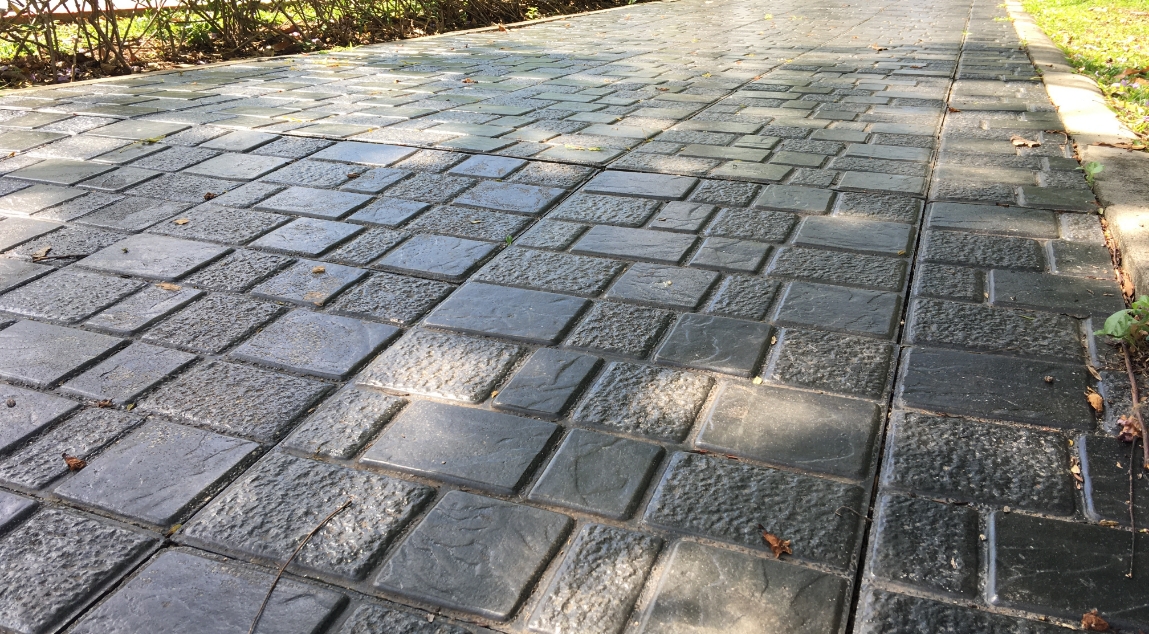
Are you planning a home project and want to revamp your kitchenette? From residential to commercial designs, concrete is used almost everywhere for interior floors or outdoor paving.
Sealing concrete can stop long-term damage by making it durable, but what sealer is best to use? If you’re a beginner DIY’er or experienced with concrete or general masonry, understanding the differences between different types of sealers will impact the quality of your concrete. This article will be your guide to the benefits of a reliable sealer, the types you can choose from, and how they provide a barrier against staining, weathering, and deterioration.
Benefits of Sealing Concrete
Why seal your concrete areas instead of leaving them as they are? Let’s explore the benefits of sealers and why it has long-lasting protection.
- It repels moisture. When exposed to water, concrete can become damaged internally. Moss and mould can grow within these damaged areas, which can weaken the concrete as time goes on. Sealing concrete can stop moisture from seeping.
- Sealers resist staining. Concrete sealers prevent stains from chemicals or grease by offering a protective layer for pool decks, patios, driveways or garages. Wipe the floors down for easy cleaning.
- They stop cracking. Concrete sealers seal small holes in your pathways that can progress into cracks.
- Sealing goes a long way in terms of maintenance. Depending on the sealer of choice and environment, sealing concrete cuts back the need for regular maintenance. If in doubt, speak to a concreting professional.
- Sealing keeps colour vibrant and shiny, preventing it from fading due to sun exposure.
- Concrete sealers last longer than concrete alone. Concrete lasts 20-25 years, and with proper sealing, yours could last up to 35 years. It’s a cost-efficient option for your new driveway.
Penetrating Sealers for Concrete
Do you want to keep plain or decorative concrete attractive with a natural-looking finish? Penetrating sealers are high-quality concrete sealers that offer a durable barrier against dirt, grime, spills, water-borne pollutants and salts, and harsh weather conditions. They also offer non-slip protection!
Preventing staining, cracking, and wear is especially important in commercial and industrial environments with high foot traffic. This sealer enhances substrate colour, blocks stains in public precincts—such as dining spaces—and provides staining resistance to food and drink spills. Three-way protection for industrial concrete also prevents dust, wear, and staining caused by oils or greases.
For homeowners, penetrating sealers can make granite countertops resistant to organic materials while allowing surfaces to breathe. There’s no need to replace these structures within the home with a quality penetrating sealer.
A penetrating sealer is excellent for natural stone surfaces, concrete, pavers, brick, grout, granite, limestone, sandstone, travertine, slate, and more.
Film-Forming Sealers for Concrete
Also known as film-coating, topical sealers, or surface-coating sealers, film-forming sealers coat the entire surface. Adhering to the pores of the concrete, they sit on the surface as a protective layer against moisture, spills, wear and tear, and contaminant damage and are simple to reapply.
Film-forming sealers beautify your surface by darkening its colour with a semi-gloss or glossy finish. Some fast-dry for as little as 20 minutes. Concrete, brick, pavers, stamped concrete, and decorative stains are suitable substrates.
The 3 Types of Film-Forming Sealers
Acrylic sealers. These sealers are cost-effective and easy to apply to surfaces. They are available in solvent-based and water-based varieties.
Urethane sealers. Slightly thicker than regular acrylic concrete sealers, urethane protects surfaces against abrasive, chemical substances, scuffs, and stains.
Epoxies. Ideal for interiors, epoxy sealers are clear or pigmented and consist of two components that need to be mixed before being painted.
Solvent-Based Acrylic Sealers for Concrete
Widely used for footpaths, driveways, and pool exteriors, solvent-based acrylic sealers are hard-wearing and have a glossy, wet-look finish for outdoor spaces. Acrylic sealers can be applied to new and old concrete and resist stains, water, abrasion, and several chemicals.
With solvent-based sealers, polymer chains and solvent create a solution: when the solvent evaporates, the space between the polymer chains decreases, and these bunched-up polymer chains form a seamless concrete coating.
Solvent-based acrylic sealers are UV-resistant and fully transparent, immune to photochemical breakdown, making them durable and protective. Easily spray or roll on these sealers with minimal surface preparation.
Water-Based Acrylic Sealers for Concrete
Water-based acrylic sealers are low in VOCs, so they are better for the environment and suit people sensitive to strong chemicals. Ideal for indoor applications such as concrete floors, water-based sealers leave the original colour and texture of concrete unchanged.
Water-based sealers don’t release harmful vapours into the atmosphere, are safer to apply indoors for installers, eliminate sealer issues such as bubbling, streaking or roller marks, are available in high-gloss or matte finishes, and don’t darken surfaces as much as solvent-based sealers. A water-based sealer is definitely colour-enhancing for your project’s natural look!
Sodium Silicate Sealers for Concrete
Unlike other coatings, sodium silicate sealers penetrate deeply into the concrete to form stronger protection against stains, water and damage instead of only protecting the surface.
If you want to improve the tensile behaviour of your concrete, sodium silicate sealers react with the sodium hydroxide present in all concrete, a result of the hydration – or curing – process.
This chemical reaction causes calcium silicate hydrate, which fills the small pores and cracks to permanently seal concrete internally. This sealing option is resistant to road salts and mould, and there’s no need to worry about heavy objects or vehicles moving across the floor. When prepared and applied properly, sodium silicate sealers can last over ten years!
If you would like to learn more about concrete supplies and how they can help, have a read about designing outdoor kitchens with decorative concrete!
Concrete Sealer Options Available
Unsure of what concrete sealer product will work best? Here are a few products you can consider for your next design.
i-Chem WETLOOK
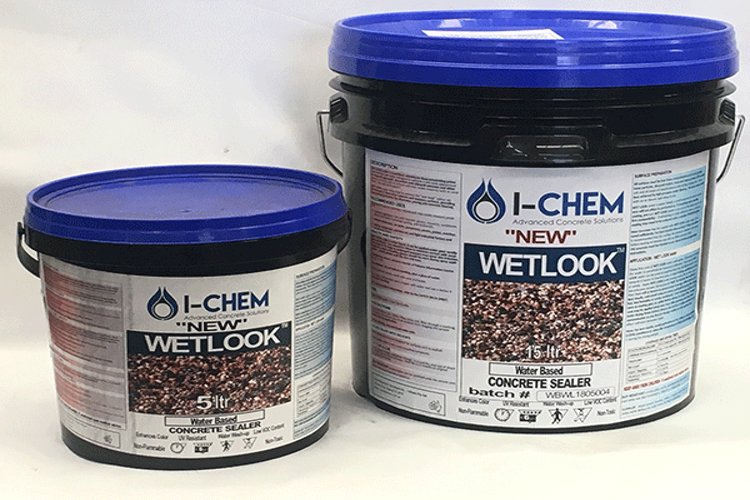
This water-borne, high-performance coating system protects and enhances the colour of decorative concrete and masonry surfaces.
The WETLOOK sealer has been formulated for exposed aggregate, decorative concrete, and other surfaces such as concrete and natural and synthetic masonry.
i-Chem WB COLOUR TINTER
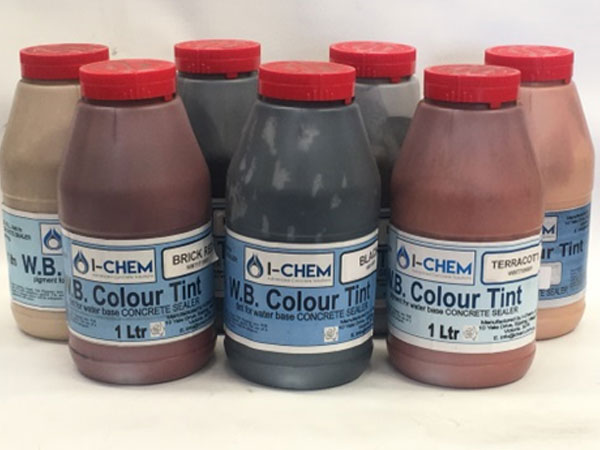
This i-Chem colour tint is designed to be added with the i-Chem NATURAL LOOK, a high gloss sealer for concrete and masonry.
The WB COLOUR tint is made with non-fading oxide pigments and is available in over 30 colours, including high-visibility colours for safety-line marking.
ASC Concrete Sealer
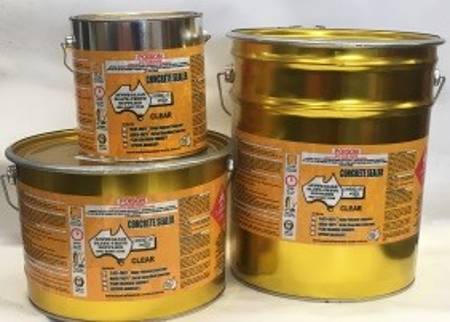
As a solvent-based acrylic coating, this sealer offers a long-lasting protective and decorative seal for concrete and masonry.
It is available in clear, high-gloss, coloured, and can be used on new or old concrete.
Choosing the Right Sealer for Your Project
How do you know if a concrete sealer is right for you?
Reasons to choose an acrylic-based sealer? You want to enhance or change the colour of your concrete, protect it from salt and moisture, create a glossy look, hide imperfections such as scratches, or improve dull or faded concrete.
Epoxy sealers seal the concrete surface, stopping water, gas, oil, and other liquids from seeping through. They’re ideal for retail stores, shop floors, auto shops, garage floors, basement floors or kitchen surfaces.
Choose epoxy sealers only for interior floors or home improvements. They are not UV-resistant and yellow in the sunshine.
Consider whether you want to change the colour or texture, if your area is exposed to sunlight, moisture, or chemicals, and the finish you want to achieve.
Australian Slate Crete Supplies – Concrete Sealers in Australia
Whether you want to rework your driveway, pool area, garage, kitchen benches or workspace, the layer of protection and proper application techniques are critical to perfect results.
As one of the leading building suppliers in Australia for over 25 years, Australian Slate Crete Supplies supports you with the ideal aesthetic appeal, a protective film, a high-gloss finish, and products that are high quality for your building project.
From sealers to concrete hardeners, stencils, hand tools, exposed aggregate supplies and release agents, we have everything you need to get the job done right the first time. After all, we think you should be able to take on projects without professional help! Contact us today or visit our store in Epping.
-
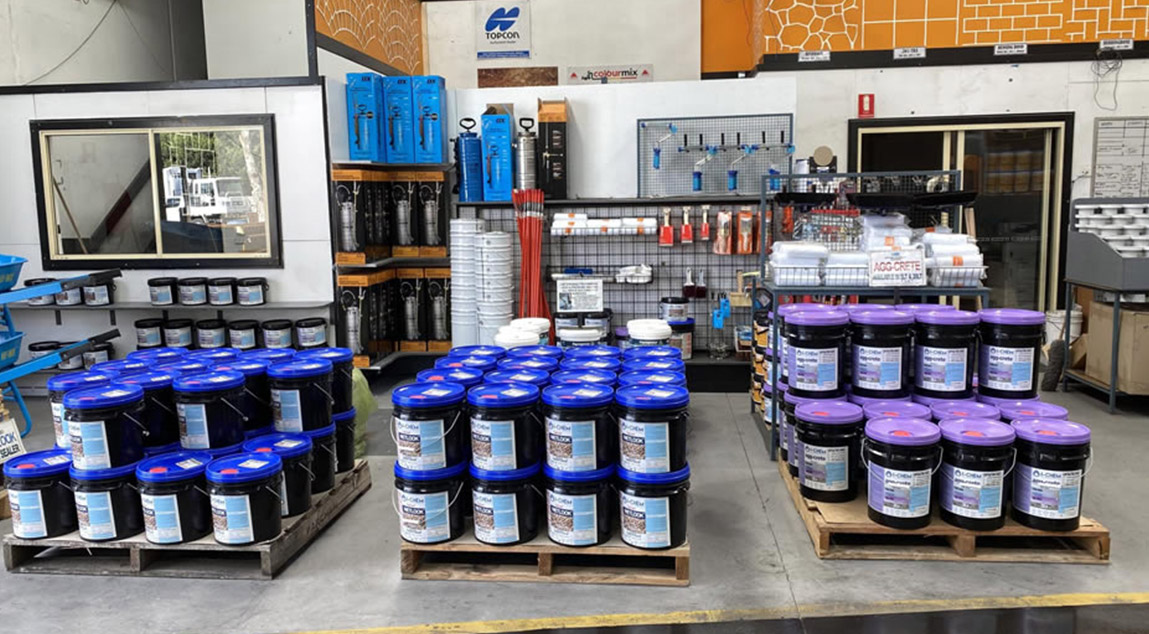 February 4, 2022Sandstone Concrete Stencil
February 4, 2022Sandstone Concrete StencilDo you want to add a touch of luxury and elegance to your concrete projects? If so, then consider using sandstone concrete stencils!
Read More -
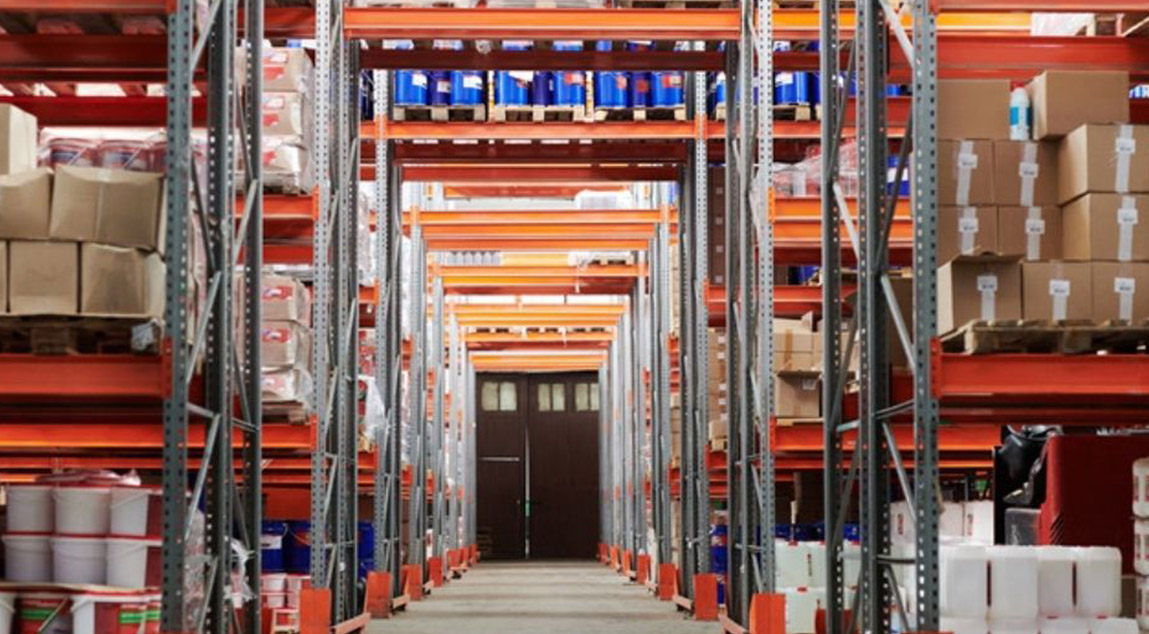 February 4, 2022Gloss Brick Sealer
February 4, 2022Gloss Brick SealerGloss brick sealer is a wonderful material for adding a brilliant shine to your brick slip wall feature.
Read More -
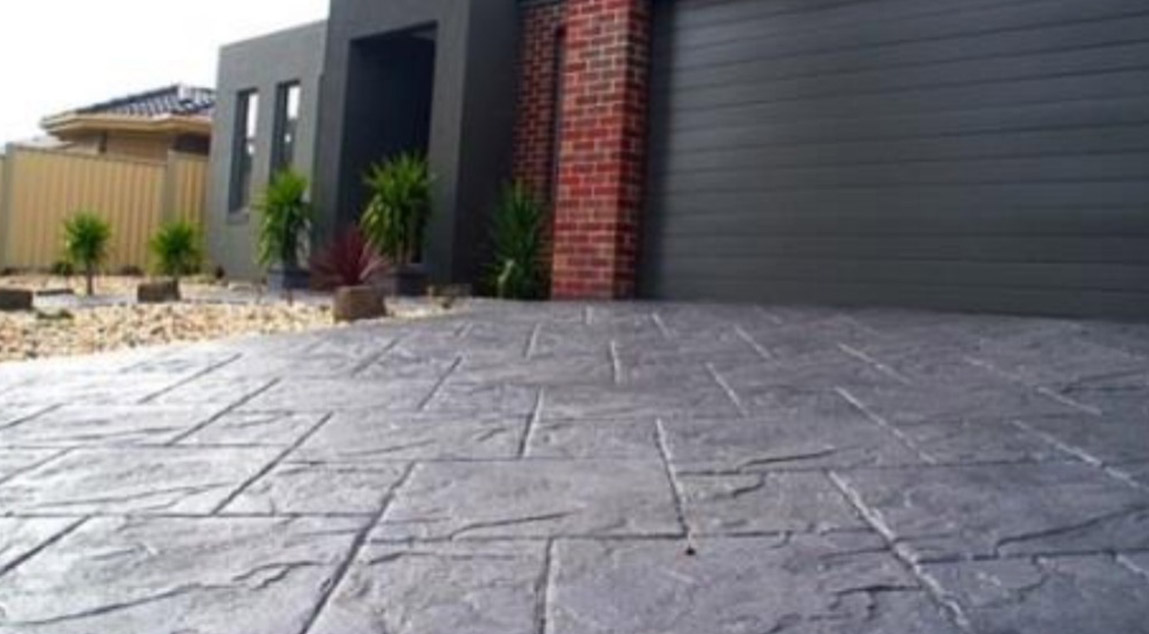 February 4, 2022Bluestone Concrete Sealer
February 4, 2022Bluestone Concrete SealerIn a broad sense, the term “bluestone” is sometimes used to refer to a variety of stones. It’s a marketing term rather than a geological one.
Read More
